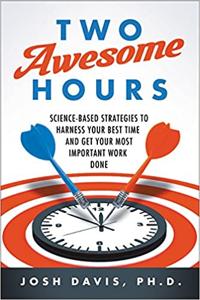
Want to learn the ideas in Two Awesome Hours better than ever? Read the world’s #1 book summary of Two Awesome Hours by Josh Davis here.
Read a brief 1-Page Summary or watch video summaries curated by our expert team. Note: this book guide is not affiliated with or endorsed by the publisher or author, and we always encourage you to purchase and read the full book.
Video Summaries of Two Awesome Hours
We’ve scoured the Internet for the very best videos on Two Awesome Hours, from high-quality videos summaries to interviews or commentary by Josh Davis.
1-Page Summary of Two Awesome Hours
Overview
Sometimes you feel like you’re busy but don’t really accomplish anything. It’s as if all of your time is spent on email, meetings, and responding to questions from colleagues that just don’t lead anywhere. What can you do to prevent these tasks from sucking the energy out of your days?
In order to be more productive, you should avoid wasting time on menial tasks and bad decisions. Here are five strategies that will help you accomplish this goal: make a schedule for yourself; focus your energy on the important things; set aside some time for rest every day; be efficient with your work; and learn how to say no.
One of the most important parts of being successful is learning how to manage your time. You can learn that by watching TED presentations and taking notes on what you’ve learned. In this book, you’ll also discover why it’s good to let your mind wander when working on a project, as well as how eating fat will help you work better and longer at a task.
Big Idea #1: In order to become awesomely effective you have to consciously recognize your decision points.
Throughout your day, you engage in a variety of habitual tasks. Think about how many times in life you’ve gotten out of bed, put on clothes and checked your email.
In these cases, we often switch off and go into automatic to get through our daily routines. Rarely do we stop to consider whether our routines make sense or if they’re efficient in getting the things done that need to be done.
Take Doug. He was supposed to write a report, but he ended up answering emails instead because it’s part of his daily routine.
Many of us are guilty of not being productive because we’re stuck in a rut. We get caught up in the daily grind and don’t take time to evaluate our lives or think outside the box. However, we can change that by recognizing decision points. Decision points are those moments when something is completed or interrupted, like when someone asks you to lunch during work hours and you have to decide whether you want to continue working on your report or go eat with him/her.
By considering your options, you’ll be able to make the right decision that will help you be more productive. If you become aware of when you’re making impulsive decisions and begin making better choices, then you can get a lot more done in less time.
Big Idea #2: Managing your mental energy will bring you one step closer to being awesomely effective.
It’s rare to have only one task at a time. To get everything done, we’re forced to juggle our responsibilities and priorities. Should you sort through your emails or prepare for the meeting? It’s important to choose wisely because you only have so much mental energy available. Unfortunately, juggling too many things can reduce your mental energy by causing mental fatigue. This happens when you overwork your executive functions of the brain that help manage and control them.
If you turn off your email alerts while preparing for a meeting, you can focus on the task at hand and still be ready to deal with important emails.
Decisions, even small ones, can also be mentally draining. Other activities that are known to deplete mental energy include networking and switching back and forth between tasks.
It is not possible to avoid all the activities that tire your mind, but if you remain aware of those tasks and refrain from performing them before a crucial task, then it will help you focus on that task. If finishing an important report is the most critical thing for today’s work, then don’t start off by responding to emails like you usually do. Instead, start with the report immediately.





